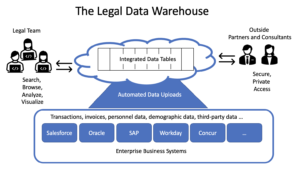Traditionally, the term “Data Warehouse” conjures up images of heavy IT investments in infrastructure and tools that may make sense for running your business, but are difficult to justify for the legal team. And for companies that do have a centralized data warehouse in place, the needs of the legal team are rarely prioritized high enough to be addressed by the over-burdened IT group managing the data.
Why Does It Matter?
Legal teams, particularly in healthcare and life sciences industries, have a growing set of requirements that demand data-driven solutions. Legal matters, internal investigations, compliance monitoring, and regulatory reporting are all areas where the legal team is expected to be more proactive and experienced with data to address the growing requirements and number of incidents.
Over-burdened IT teams rarely have the bandwidth to prioritize the legal or compliance team requirements. Traditional corporate data warehouses may not be appropriate for many of these legal use cases anyway. Data privacy, particularly with healthcare-related data, is a constant concern. When dealing with any kind of legal investigation, particularly internal cases of potential misconduct, confidentiality is critical. Mixing sensitive inquiries, analysis, and reporting with the same tools that tens or even hundreds of analysts and business users access every day is asking for trouble.
Without regular support from IT resources, the legal team is left to find their own solutions. The drawbacks of this approach include a significant drop in productivity from legal analysts drowning in spreadsheets, expensive “black box” relationships with consulting firms, and increased security risks when outsourcing data analytics to outside firms.
Hybrid Solution
Forward-looking organizations are beginning to adopt hybrid solutions by partnering with agile data partners and leveraging a private, secure, cloud-based technology. By keeping their data secure, yet integrated in a cloud environment, corporations can create secure logins for partners and outside firms without extracting and mailing data files around. In addition, with modern tools, in-house legal analysts and even attorneys can easily browse, search, analyze, and visualize their data on their own.

To learn more about the concept of a data warehouse for your legal team, download our latest white paper from Sapling Data entitled “Is It Time for a Legal Data Warehouse?”.
